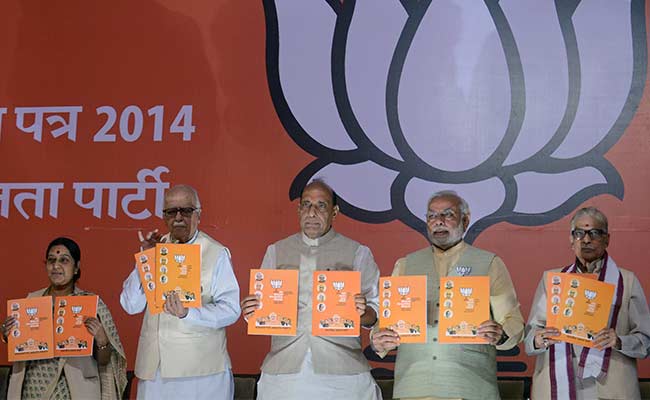
The BJP today released its much-delayed manifesto on a day India began voting for a new government in the first of a nine-phase general election spread over 36 days. "Ek Bharat, Shreshtha Bharat" (One India, great India) and "Sabka Saath, Sabka Vikaas" are the main slogans of the 52-page manifesto.
Here are the key points of the BJP manifesto
Narendra Modi, the BJP's prime ministerial candidate, said good governance and inclusive development would dominate his agenda. "I will do nothing for myself. I will do nothing out of ill-intent," he vowed.
Emphasizing its stand on a key economic policy, the BJP says it will welcome Foreign Direct Investment in all sectors that will create jobs, except in multi-brand retail. (Read full manifesto)
In what is likely to be controversial, the BJP has pledged to draft a Uniform Civil Code to "ensure gender equality." It also promises to do away with the Article 370 of the Constitution, giving special status to Jammu and Kashmir.
The manifesto also mentions the BJP's old promise for a Ram temple at the disputed site of the razed Babri mosque in Ayodhya. It calls for the building of a grand temple at the site "within the Constitutional framework."
The party has promised a low-cost housing programme to give every family a proper home within a decade, and 100 new "smart cities."
It will also focus on reforms in taxation to attract investors and end "tax terrorism". The party says it will adopt a national General Sales Tax.
The BJP aims to link welfare programmes like the Congress-led government's rural jobs schemes to assets creation, for example infrastructure building. It promises high speed bullet trains.
A new health policy, the National Health Assurance Mission, will seek to provide "accessible, affordable and effective health care system."
The party has made "water to every village, water to every field" its priority, said Mr Joshi.
The BJP says it will revise and update the nuclear doctrine.

